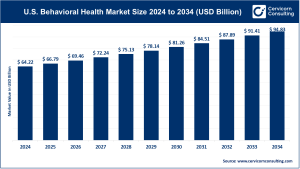Market Overview
The global precision medicine market was valued at approximately USD 103.81 billion in 2024 and is expected to grow to around USD 464.26 billion by 2034, registering a CAGR of 16.15% during the forecast period. Precision medicine, also called personalized medicine, shifts healthcare from traditional “one-size-fits-all” treatments to individualized strategies tailored to a patient’s genetic profile, lifestyle, and environmental factors. By leveraging technologies such as genomics, molecular diagnostics, and bioinformatics, precision medicine enables accurate disease prediction, optimized therapies, and minimized adverse reactions, ultimately improving patient outcomes.
📄 Get a Free Sample: Cervicorn Precision Medicine Market
Key Market Trends
-
Artificial Intelligence (AI) and Machine Learning (ML): AI and ML are transforming precision medicine by analyzing large datasets to enhance diagnostics and therapy planning. Predictive algorithms, for instance, help determine the most effective treatments for specific genetic profiles.
-
Biomarker-Based Diagnostics: Increased use of biomarkers facilitates early disease detection and targeted interventions, improving both safety and treatment efficacy.
-
Expansion of Genetic Testing Services: Greater accessibility and affordability of genetic testing enable healthcare providers to design patient-specific treatment plans, boosting adoption of precision medicine.
-
Integration with Big Data Analytics: Real-time data analytics and sharing support continuous monitoring, predictive modeling, and enhanced decision-making for personalized care.
-
Collaborative Healthcare Ecosystems: Partnerships among biotech companies, academic institutions, and healthcare providers accelerate innovation in diagnostics and targeted therapeutics.
Market Drivers
-
Rising Prevalence of Chronic and Genetic Diseases: Increasing incidences of cancer, cardiovascular disorders, and other chronic conditions drive demand for personalized treatments.
-
Technological Advancements: Innovations in genome sequencing, bioinformatics, and high-throughput screening improve diagnostic accuracy and speed.
-
Government Support and Funding: Public initiatives and investments in genomics research and precision medicine programs stimulate market growth.
-
R&D Investments: Pharmaceutical and biotechnology companies are heavily investing in novel therapeutics, diagnostics, and AI-powered solutions.
-
Digital Health Adoption: Implementation of AI and digital platforms enhances clinical decision-making and operational efficiency.
Impact of Trends and Drivers
The above trends and drivers are shaping multiple market segments, including diagnostics, therapeutics, and drug development, while influencing regional growth patterns. North America leads in revenue due to advanced healthcare infrastructure and programs such as the NIH’s All of Us Research Program. Europe follows, driven by strong genomic research initiatives, whereas Asia-Pacific is witnessing rapid expansion fueled by emerging healthcare infrastructure and government-led precision medicine initiatives in China and Japan.
Challenges & Opportunities
While the precision medicine market offers significant growth potential, it faces challenges such as high treatment costs, regulatory barriers, and data privacy concerns. Nonetheless, opportunities exist in expanding access to genetic testing, AI-powered drug discovery, and international collaborations, which enhance early disease detection and patient-centered care.
Future Outlook
The precision medicine market is projected to grow exponentially, reaching nearly USD 464.26 billion by 2034 at a CAGR of 16.15%. Technological integration, AI-driven analytics, and collaborative healthcare models are expected to transform patient-centered treatment, redefining healthcare delivery worldwide.
📞 Contact for Detailed Overview: Cervicorn Contact
